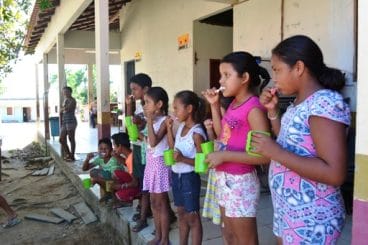
Aug 31, 2017 | Focolare Worldwide
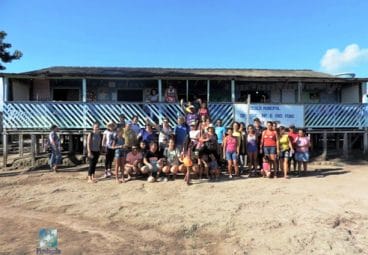 Óbidos, on the left bank of the Amazon River, about 682 miles from the capital, Belem, is a city of almost 50,000 inhabitants. There is only one hospital, which is run by the Third Order of St. Francis and absolutely insufficient to assist the most serious cases. After an appeal of the Brazilian Conference of Bishops, for some years now a big group of doctors, nurses and common people, have undertaken journeys to bring healthcare and support to the population, especially in the river communities. The Amazon Project is now known to many. Upon reaching Óbidos in July, the “missionaries” of this year consisting of about 40 people from various parts of Brazil, gathered during the recent Run4Unity of Belém, and enjoyed the cooperation and hospitality of the local families. Preparations for this event took several months, and dispatches were made – by air and river – of 15 big boxes of medicine, dentistry material and toys. The Mayor hosted four participants, placed at the disposal of the missionaries, a boat and a coach which was used to visit the communities in the interior of the “ribeirinhas” (three communities that never receive medical care and rarely go to the city), and paid for the services of a cook during their stay. The first community encountered were the 2,000 people living in an area next to a “lixão” (dumpsite). The group stayed there for three days. Much more than the figures (8 days, 611 medical checkups and 221 dental checkups) the remarks of the protagonists, doctors and local people stand out. A woman who was treated for a strong headache, returned after a few days to breathe that atmosphere which she described as “the air of paradise.” At the end of the “treatment” her headache had almost disappeared. Eliane comes from São Paulo: “Before coming here, I gathered information on the internet. But here, things are a completely different thing, a lesson I shall remember all my life. After the trauma I underwent – referring to the recent death of her husband – I thought I would remain indifferent to any other pain. Instead, I now am full of ideas and a great desire to help!”
Óbidos, on the left bank of the Amazon River, about 682 miles from the capital, Belem, is a city of almost 50,000 inhabitants. There is only one hospital, which is run by the Third Order of St. Francis and absolutely insufficient to assist the most serious cases. After an appeal of the Brazilian Conference of Bishops, for some years now a big group of doctors, nurses and common people, have undertaken journeys to bring healthcare and support to the population, especially in the river communities. The Amazon Project is now known to many. Upon reaching Óbidos in July, the “missionaries” of this year consisting of about 40 people from various parts of Brazil, gathered during the recent Run4Unity of Belém, and enjoyed the cooperation and hospitality of the local families. Preparations for this event took several months, and dispatches were made – by air and river – of 15 big boxes of medicine, dentistry material and toys. The Mayor hosted four participants, placed at the disposal of the missionaries, a boat and a coach which was used to visit the communities in the interior of the “ribeirinhas” (three communities that never receive medical care and rarely go to the city), and paid for the services of a cook during their stay. The first community encountered were the 2,000 people living in an area next to a “lixão” (dumpsite). The group stayed there for three days. Much more than the figures (8 days, 611 medical checkups and 221 dental checkups) the remarks of the protagonists, doctors and local people stand out. A woman who was treated for a strong headache, returned after a few days to breathe that atmosphere which she described as “the air of paradise.” At the end of the “treatment” her headache had almost disappeared. Eliane comes from São Paulo: “Before coming here, I gathered information on the internet. But here, things are a completely different thing, a lesson I shall remember all my life. After the trauma I underwent – referring to the recent death of her husband – I thought I would remain indifferent to any other pain. Instead, I now am full of ideas and a great desire to help!”  Tiago, a youth from Óbidos is participating for the second time in the Project. Since he couldn’t buy a pair of eyeglasses, a collection was made: “Seeing so much generosity made me want to do something myself!” Ana Carla (doctor): “I realised that our reality is not the worst one! Upon listening to some mothers that their son had never been visited by a doctor made me think: I may not be able to solve the problem, but I can love, listen, give comfort, or a drug. This is already something. I don’t feel tired, but my weariness lies in having to ask: “What does your child eat?” and hear them answer: “flour.” Amanda is studying medicine: “I now see medicine with another vision: in front of me is the sick person and not only his illness. We cannot be satisfied only by prescribing a drug, we have to treat the person.” Ereh is a boy from Óbidos: “It is difficult to live in this situation. Mateus and I do volunteer work with children.” Solange (Belém): “When I heard about the Project, I was very interested and I asked my family’s permission to participate. I only received criticisms, but when I got here, I found a family environment which I didn’t expect. I was surprised to see the youths who, in the month of July, give up their holidays.” Also Marcos is a student of medicine: “I found myself in the impossibility of resolving serious situations, since I didn’t have the means to cure them, but only give relief. We must have the courage to make a hands-on experience and help the youths who have turned to stone in their city. Drug addiction is not the only vice, but there are others: remaining closed up in ourselves, in one’s own ego.” Victor (Santarém): “in the name of the entire Amazon, I thank you all who have left your zones to come to our peripheries.” The Project now proceeds with the diffusion and gathering of useful material and finances, so that more can be done next year.
Tiago, a youth from Óbidos is participating for the second time in the Project. Since he couldn’t buy a pair of eyeglasses, a collection was made: “Seeing so much generosity made me want to do something myself!” Ana Carla (doctor): “I realised that our reality is not the worst one! Upon listening to some mothers that their son had never been visited by a doctor made me think: I may not be able to solve the problem, but I can love, listen, give comfort, or a drug. This is already something. I don’t feel tired, but my weariness lies in having to ask: “What does your child eat?” and hear them answer: “flour.” Amanda is studying medicine: “I now see medicine with another vision: in front of me is the sick person and not only his illness. We cannot be satisfied only by prescribing a drug, we have to treat the person.” Ereh is a boy from Óbidos: “It is difficult to live in this situation. Mateus and I do volunteer work with children.” Solange (Belém): “When I heard about the Project, I was very interested and I asked my family’s permission to participate. I only received criticisms, but when I got here, I found a family environment which I didn’t expect. I was surprised to see the youths who, in the month of July, give up their holidays.” Also Marcos is a student of medicine: “I found myself in the impossibility of resolving serious situations, since I didn’t have the means to cure them, but only give relief. We must have the courage to make a hands-on experience and help the youths who have turned to stone in their city. Drug addiction is not the only vice, but there are others: remaining closed up in ourselves, in one’s own ego.” Victor (Santarém): “in the name of the entire Amazon, I thank you all who have left your zones to come to our peripheries.” The Project now proceeds with the diffusion and gathering of useful material and finances, so that more can be done next year.
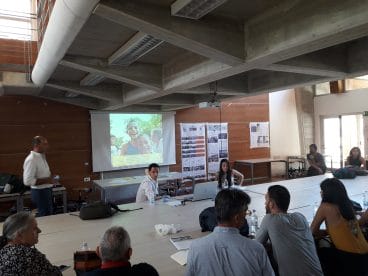
Aug 30, 2017 | Focolare Worldwide, Senza categoria
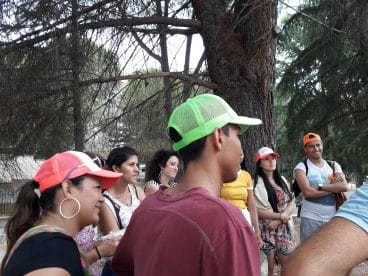 To inhabit a place in just two weeks, a place that is geographically and culturally far away from your home. This was the challenge of Habitandando: to build new bridges between, and on the other hand, a young and contrasted people, whose richness and inequalities are reflected also in its territory – made of megalopolises and immense regions. However, how do you build a bridge between Italy and Colombia in just fifteen days? How can you get to inhabit a place, to become familiar with it as if it were your home? Travel as a method therefore: to get to know a place by experiencing it, using as a testing ground for generating new and challenging ideas. And even this year, the experiences were the most diverse: crossing Central Italy by car, to distinguish how landscapes change from the coast to the mountains; living at Piazza del Campo in Siena, to observe how a public space has been functioning perfectly for centuries; walking for many hours around the centre of Rome, to distinguish each epoch in the thousand layers composing the city; exploring Tor Bella Monaca, a neighbourhood in the Roman periphery where failed architecture projects add up to a fragile social condition.
To inhabit a place in just two weeks, a place that is geographically and culturally far away from your home. This was the challenge of Habitandando: to build new bridges between, and on the other hand, a young and contrasted people, whose richness and inequalities are reflected also in its territory – made of megalopolises and immense regions. However, how do you build a bridge between Italy and Colombia in just fifteen days? How can you get to inhabit a place, to become familiar with it as if it were your home? Travel as a method therefore: to get to know a place by experiencing it, using as a testing ground for generating new and challenging ideas. And even this year, the experiences were the most diverse: crossing Central Italy by car, to distinguish how landscapes change from the coast to the mountains; living at Piazza del Campo in Siena, to observe how a public space has been functioning perfectly for centuries; walking for many hours around the centre of Rome, to distinguish each epoch in the thousand layers composing the city; exploring Tor Bella Monaca, a neighbourhood in the Roman periphery where failed architecture projects add up to a fragile social condition.  The travel is the method and the territory is the classroom. Each stage of the travel was devoted to a specific issue: for example, the Tuscany countryside explains territory and landscape, the Amalfi Coast shows both the antique and the modern, the towns hit by earthquakes in Central Italy show the relationship between memory and catastrophe. Having the territory as classroom allows first-hand observation of each issue, but is it’s not simply a way of going beyond the simplistic explanations by tourist guides and school textbooks. Rather, it is an occasion to incrementally build by yourself the knowledge on a given place. In fact, the participants were asked to focus on each place that they visited by writing pieces for different audiences, taking photographs with different communicative aims, developing their own explanations on specific settings and phenomena. Day by day, the first ingenuous reactions leave space to deeper reasonings. Maybe Tor Bella Monaca, the neighbourhood in the Roman periphery, provides the most interesting example: the initial skepticism (“Is this a poor and degraded neighbourhood? If only all poor places in Colombia were like this!”) is replaced by all the new ideas that it can generate. The participants’ disorientated looks of the first days were gradually replaced by more relaxed ones, once a relationship was established with the visited places and also the challenges facing them. The tension between memory and innovation were the guiding thread behind this year’s initiative, and this emerged also from the comments made at the end of the travel. For a Colombian student, Italy carries with her centuries of history but does not know how to manage such heritage, does not understand how nowadays heritage can interact with the demands of the habitat. These reflections were developed in the last days of the travel, spent in Montefalcone Appennino, It was the beginning of a think-tank which can yield varying results, but which already demonstrates what can be achieved through a new way of studying the habitat, by going out of the classrooms into the territory, inhabiting it on the move so to speak: to inhabit a place is not just to know it, but also to start imagining it differently from what it is right now. Compiled by Dialogue in Architecture
The travel is the method and the territory is the classroom. Each stage of the travel was devoted to a specific issue: for example, the Tuscany countryside explains territory and landscape, the Amalfi Coast shows both the antique and the modern, the towns hit by earthquakes in Central Italy show the relationship between memory and catastrophe. Having the territory as classroom allows first-hand observation of each issue, but is it’s not simply a way of going beyond the simplistic explanations by tourist guides and school textbooks. Rather, it is an occasion to incrementally build by yourself the knowledge on a given place. In fact, the participants were asked to focus on each place that they visited by writing pieces for different audiences, taking photographs with different communicative aims, developing their own explanations on specific settings and phenomena. Day by day, the first ingenuous reactions leave space to deeper reasonings. Maybe Tor Bella Monaca, the neighbourhood in the Roman periphery, provides the most interesting example: the initial skepticism (“Is this a poor and degraded neighbourhood? If only all poor places in Colombia were like this!”) is replaced by all the new ideas that it can generate. The participants’ disorientated looks of the first days were gradually replaced by more relaxed ones, once a relationship was established with the visited places and also the challenges facing them. The tension between memory and innovation were the guiding thread behind this year’s initiative, and this emerged also from the comments made at the end of the travel. For a Colombian student, Italy carries with her centuries of history but does not know how to manage such heritage, does not understand how nowadays heritage can interact with the demands of the habitat. These reflections were developed in the last days of the travel, spent in Montefalcone Appennino, It was the beginning of a think-tank which can yield varying results, but which already demonstrates what can be achieved through a new way of studying the habitat, by going out of the classrooms into the territory, inhabiting it on the move so to speak: to inhabit a place is not just to know it, but also to start imagining it differently from what it is right now. Compiled by Dialogue in Architecture
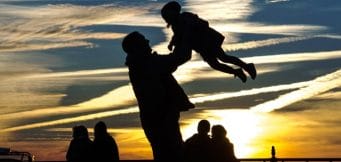
Aug 29, 2017 | Focolare Worldwide
 New flowering “As Christians, my wife and I decided to adopt two sisters. Unfortunately, due to bad company, both have ended up in the drug cycle. Since then, a Calvary began for us: abortions, undesired children, problems with the law. We undertook to make our home a place of peace where they are welcomed. Now, the elder one is slowly recovering and not only wants to take care of her baby girl but also the son of her sister who is still in the drug tunnel. We are witnessing life blooming again.” (M and D. H. – Switzerland) An innocent absolved «I am a lawyer by profession. Some months ago I took the defence of a Sudanese citizen accused of being a transporter of immigrants and even a member of a criminal organization. He was seen at the helm of a boat that was transporting 119 migrants, among which were women and children. In the interviews held with him in jail, I realized that he was a refugee like the others, and had been abandoned by the transporter, and had taken the courage to take the helm of the boat despite his lack of experience, to save himself along with the others. Unfortunately they did not believe his recount. On taking the defence of this youth’s suffering, I decided to demonstrate his innocence despite the fact that, due to his poverty, he couldn’t have paid my fees. Of course, I could have made use of the sponsorship of the State, which however, does not always pay and if ever, the payments are inadequate. But he was a brother, and during the trial I did my best to defend him. In the end, he was absolved.” (S. – Italy) The “agreement” «As always, dad had drunk more than necessary and there was tension at home. Since nobody said a word, I took the courage, and looking him straight in the eye, told him of the suffering and dismay he was causing us due to his vice. Then also the other brothers spoke up. Things then changed and in the family a sort of agreement was made and now dad is doing his best to be faithful to his promise not to drink. Closing our eyes had not been a way of helping him, and we had to tell him the truth, with love. And together we succeeded.” (N.N. – South America) A son’s gratitude «As time passes my gratitude towards my mom grows. After dad had abandoned us, she had continued to work hard so that we, the four children, wouldn’t lack in anything. One day she went to the funeral of her brother-in-law and returned with an eight-month-old baby in her arms. Her sister was not in the condition to care for him. This was how we were raised. I think that the goodness which now reigns in our families is a fruit of the grandeur of my mother, who did not think of herself, but always of the others.” (C. A. – Poland)
New flowering “As Christians, my wife and I decided to adopt two sisters. Unfortunately, due to bad company, both have ended up in the drug cycle. Since then, a Calvary began for us: abortions, undesired children, problems with the law. We undertook to make our home a place of peace where they are welcomed. Now, the elder one is slowly recovering and not only wants to take care of her baby girl but also the son of her sister who is still in the drug tunnel. We are witnessing life blooming again.” (M and D. H. – Switzerland) An innocent absolved «I am a lawyer by profession. Some months ago I took the defence of a Sudanese citizen accused of being a transporter of immigrants and even a member of a criminal organization. He was seen at the helm of a boat that was transporting 119 migrants, among which were women and children. In the interviews held with him in jail, I realized that he was a refugee like the others, and had been abandoned by the transporter, and had taken the courage to take the helm of the boat despite his lack of experience, to save himself along with the others. Unfortunately they did not believe his recount. On taking the defence of this youth’s suffering, I decided to demonstrate his innocence despite the fact that, due to his poverty, he couldn’t have paid my fees. Of course, I could have made use of the sponsorship of the State, which however, does not always pay and if ever, the payments are inadequate. But he was a brother, and during the trial I did my best to defend him. In the end, he was absolved.” (S. – Italy) The “agreement” «As always, dad had drunk more than necessary and there was tension at home. Since nobody said a word, I took the courage, and looking him straight in the eye, told him of the suffering and dismay he was causing us due to his vice. Then also the other brothers spoke up. Things then changed and in the family a sort of agreement was made and now dad is doing his best to be faithful to his promise not to drink. Closing our eyes had not been a way of helping him, and we had to tell him the truth, with love. And together we succeeded.” (N.N. – South America) A son’s gratitude «As time passes my gratitude towards my mom grows. After dad had abandoned us, she had continued to work hard so that we, the four children, wouldn’t lack in anything. One day she went to the funeral of her brother-in-law and returned with an eight-month-old baby in her arms. Her sister was not in the condition to care for him. This was how we were raised. I think that the goodness which now reigns in our families is a fruit of the grandeur of my mother, who did not think of herself, but always of the others.” (C. A. – Poland)
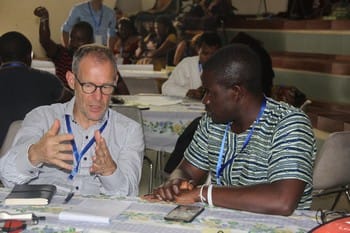
Aug 28, 2017 | Focolare Worldwide
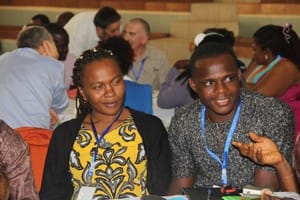 They were from a variety of countries: the Democratic Republic of the Congo, Angola, Uganda, Nigeria, Ivory Coast, Cameroon, Burkina-Faso, Madagascar, Benin and Holland. The fifty five entrepreneurs wanted to put their 30 innovative entrepreneurial projects to the test, with an international force of “mentors” (seven African, five European and one South American). The first African StartUp Lab 2017 was held last June, in the heart of the African forest in Fontem, Cameroon. It consisted of five days of learning how to practice the values of the Economy of Communion that are already being implemented by many entrepreneurs connected with the Economy of Communion around the world. The idea of a week for project development had been conceived two years earlier. In Nairobi, in 2015, during the international assembly of the EoC, several young people had shared with the first generation of EoC entrepreneurs their own dream of realizing several projects. This led to the launch of a two-year incubation period for those projects. In June 2017, during the StartUp Lab held at Mafua Ndem Mariapolis in Fontem, several of those dreams already began to move forward produce.
They were from a variety of countries: the Democratic Republic of the Congo, Angola, Uganda, Nigeria, Ivory Coast, Cameroon, Burkina-Faso, Madagascar, Benin and Holland. The fifty five entrepreneurs wanted to put their 30 innovative entrepreneurial projects to the test, with an international force of “mentors” (seven African, five European and one South American). The first African StartUp Lab 2017 was held last June, in the heart of the African forest in Fontem, Cameroon. It consisted of five days of learning how to practice the values of the Economy of Communion that are already being implemented by many entrepreneurs connected with the Economy of Communion around the world. The idea of a week for project development had been conceived two years earlier. In Nairobi, in 2015, during the international assembly of the EoC, several young people had shared with the first generation of EoC entrepreneurs their own dream of realizing several projects. This led to the launch of a two-year incubation period for those projects. In June 2017, during the StartUp Lab held at Mafua Ndem Mariapolis in Fontem, several of those dreams already began to move forward produce. 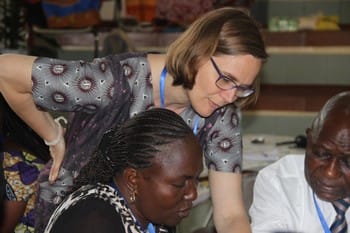 The workshop began with Anouk Grevin, French member of the faculty of the Polytech University of Nantes, and of the Economy and Management course at Sophia University Institute, who presented the fundamental values of the Economy of Communion. Argentinean, Forencia Locascio, expert in social communication, explained the “elevator pitch” that helps to present one’s own entrepreneurial approach to any possible client or investor, in a clear and succinct manner, and in a shor time. French entrepreneur, Pierre Chevalier, presented a workshop on innovative ideas and project analysis, as well as the resources required. The image of an iceberg is perhaps the best way to explain all the effort, work and sacrifice that lies hidden beneath the surface of any successful entrepreneurial project.
The workshop began with Anouk Grevin, French member of the faculty of the Polytech University of Nantes, and of the Economy and Management course at Sophia University Institute, who presented the fundamental values of the Economy of Communion. Argentinean, Forencia Locascio, expert in social communication, explained the “elevator pitch” that helps to present one’s own entrepreneurial approach to any possible client or investor, in a clear and succinct manner, and in a shor time. French entrepreneur, Pierre Chevalier, presented a workshop on innovative ideas and project analysis, as well as the resources required. The image of an iceberg is perhaps the best way to explain all the effort, work and sacrifice that lies hidden beneath the surface of any successful entrepreneurial project.  Topics such as budget, cash flow, sales, production cost and financial reporting were presented by Giampietro Parolin, business strategy instructor at SUI. The practical exercises on product and cost helped in understanding financial components such calculating and sales forecast. Markus Ressl, a consultant from Ressolution and an entrepreneur from the EoC, analyzed different business models with the young people. Markus Ressl, “Ressolution” consultant and EoC entrepreneur, analyzed the theory and practice of different EoC business models with young entrepreneurs. On the last day everyone was back with Locascio for a discussion on communication strategies: company names, logos, slogans and the use of communication tools with different groups of clientele. A symbolic image was presented to each person along with a certificate at the conclusion of the workshop. The symbol showed a network of people gathered around the Mafua Ndem Mariapolis in Cameroon, with a new to do economy. Their arms are raised and linked by a small cord that represents a pact of reciprocity.
Topics such as budget, cash flow, sales, production cost and financial reporting were presented by Giampietro Parolin, business strategy instructor at SUI. The practical exercises on product and cost helped in understanding financial components such calculating and sales forecast. Markus Ressl, a consultant from Ressolution and an entrepreneur from the EoC, analyzed different business models with the young people. Markus Ressl, “Ressolution” consultant and EoC entrepreneur, analyzed the theory and practice of different EoC business models with young entrepreneurs. On the last day everyone was back with Locascio for a discussion on communication strategies: company names, logos, slogans and the use of communication tools with different groups of clientele. A symbolic image was presented to each person along with a certificate at the conclusion of the workshop. The symbol showed a network of people gathered around the Mafua Ndem Mariapolis in Cameroon, with a new to do economy. Their arms are raised and linked by a small cord that represents a pact of reciprocity.
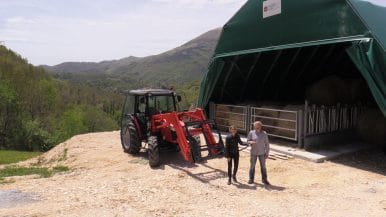
Aug 24, 2017 | Focolare Worldwide
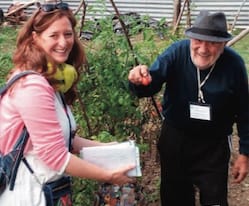 Many people have continued to work after the earthquake in central Italy last year, standing by those who were affected by those who were so awfully affected by that tragedy. It was such a vast catastrophe that it tested not only the physical infrastructure, but also the very social fabric and personal resistance of an entire generation of families. The Focolare Movement has a stable organism that works in collaboration with two associations: United World Project and New Families Association, but also other groups (AIPEC, B&F Foundation, Planetary Embrace, Dialogue in Architecture and local Focolare communities in Italy). They provide expertise in channelling the aid more effectively. “Our first objective was to come up with a way of linking and knowing the different projects so that we could keep awareness high and not forget…” says Cesare Borin from the Focolare’s Emergency Aid project. The financial aid that began to arrive immediately is only one part of many other forms of aid that have solidified the assistance, which involves many people from the Movement in being close to the people who have lost everything in this dramatic event.” The project is comprised of two complimentary efforts:
Many people have continued to work after the earthquake in central Italy last year, standing by those who were affected by those who were so awfully affected by that tragedy. It was such a vast catastrophe that it tested not only the physical infrastructure, but also the very social fabric and personal resistance of an entire generation of families. The Focolare Movement has a stable organism that works in collaboration with two associations: United World Project and New Families Association, but also other groups (AIPEC, B&F Foundation, Planetary Embrace, Dialogue in Architecture and local Focolare communities in Italy). They provide expertise in channelling the aid more effectively. “Our first objective was to come up with a way of linking and knowing the different projects so that we could keep awareness high and not forget…” says Cesare Borin from the Focolare’s Emergency Aid project. The financial aid that began to arrive immediately is only one part of many other forms of aid that have solidified the assistance, which involves many people from the Movement in being close to the people who have lost everything in this dramatic event.” The project is comprised of two complimentary efforts:  “RImPRESA Businesses” which consists in providing raw materials, machinery and small infrastructure to businesses and, where possible, to strengthen virtuous and ethical business processes and practices that allow for pairing with other businesses on a national level. This effort has focused on 60 small businesses in the four regions that were hit, and they are recently finishing the furnishing of 25 agricultural and handicraft businesses with equipment. The second activity: “RImPRESA GAS” promotes the purchase of products from businesses affected by the earthquake, through the creation of the Gruppi di Acquisto Solidale (GAS) that supports local tourism. Currently, there are 13 agribusinesses with a total of 90 enrolments with a total of 17,000 euros in orders. The response to the people in need was quick, like that for several families from Amatrice that had asked for a sheet metal container. In March they received 10 containers for themselves and many other families of Amatrice and the surrounding areas, at a total cost of 19,000 euros. A summer camp is being set up for the end of August in collaboration with the Italian Caritas, which will be based at Torrita di Amatrice. Activities will continue during the months of July and August with plans for a summer children’s community centre, recreational activities for teenagers from the area, and for the elderly in rehabilitation centres in Borbona. Borin concludes: “The people from these beautiful regions never ask us to rebuild their homes, but they do strongly ask that we don’t leave them all alone! Amongst the lessons learned has been the importance of never marginalising or suffocating the contribution from civil society. Alongside the competent intervention of these state agencies, we need a more vast and programmatic inclusion of social agencies and groups precisely because of their ability to make the work of institutions more efficacious also in restarting the process of production.” Contacts: emergenzaterremoto.italia@dev.focolare.org
“RImPRESA Businesses” which consists in providing raw materials, machinery and small infrastructure to businesses and, where possible, to strengthen virtuous and ethical business processes and practices that allow for pairing with other businesses on a national level. This effort has focused on 60 small businesses in the four regions that were hit, and they are recently finishing the furnishing of 25 agricultural and handicraft businesses with equipment. The second activity: “RImPRESA GAS” promotes the purchase of products from businesses affected by the earthquake, through the creation of the Gruppi di Acquisto Solidale (GAS) that supports local tourism. Currently, there are 13 agribusinesses with a total of 90 enrolments with a total of 17,000 euros in orders. The response to the people in need was quick, like that for several families from Amatrice that had asked for a sheet metal container. In March they received 10 containers for themselves and many other families of Amatrice and the surrounding areas, at a total cost of 19,000 euros. A summer camp is being set up for the end of August in collaboration with the Italian Caritas, which will be based at Torrita di Amatrice. Activities will continue during the months of July and August with plans for a summer children’s community centre, recreational activities for teenagers from the area, and for the elderly in rehabilitation centres in Borbona. Borin concludes: “The people from these beautiful regions never ask us to rebuild their homes, but they do strongly ask that we don’t leave them all alone! Amongst the lessons learned has been the importance of never marginalising or suffocating the contribution from civil society. Alongside the competent intervention of these state agencies, we need a more vast and programmatic inclusion of social agencies and groups precisely because of their ability to make the work of institutions more efficacious also in restarting the process of production.” Contacts: emergenzaterremoto.italia@dev.focolare.org
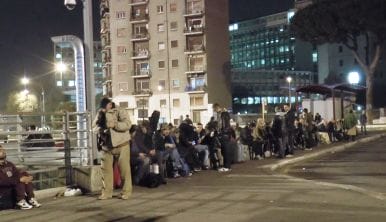
Aug 23, 2017 | Focolare Worldwide
 “Re”-turn, “Re”-cognize, “Re”-view, “Re”-embrace, “Re”-member. Going back to Ostiense, I have butterflies in my stomach. I look for my friends in desperation. These past months I left Rome behind with its great beauty (the kind around the train stations, that is). To console me, some have used reassuring expressions like “never mind, you’ll find the poor, the least among us, the homeless, wherever you go.”But I don’t love the poor or the least. I love Samir, Fulvio, Gian Paolo, Gabriele, Jazmin… Ladies and gentlemen, this is called friendship. Claudio treats me with the tenderness of a whisper, although he has a past that is more rough, harsh and violent than anyone. When I was an ocean away, I realized that friendship had changed him, but above all it had changed me. I talk, I listen, I sit down, and I feel truly at home. This sense of “re”-entry and “re”-turn is a bit of a taste of what they call heaven… “re”-acquired after it had been lost. I “re”-listen to their stories and absurdities. Inside myself these past months, I found some pressing questions about the sense of life paths, the paradox of decisions, disrupted plans, and trepidation about my own mission. I tend to get lost in these pretentions, but I see that my friends do not have a path, mission, choices nor even know how to tell their stories. I had become lost in all these middle-class demands, but here and now, I stop getting lost. These are my friends, and it wouldn’t be right to have something for myself that they cannot have. Ladies and gentlemen, this is friendship. As I come out of myself, out of my will, my demands, I continually ask – for them, for me – for the thread… the thread that connects everything under heaven, our stories and all the stories, in a single plan. I ask for it humbly. I “re”-embrace myself, greet myself with wet eyes and say, “Hi Paula, welcome back!”
“Re”-turn, “Re”-cognize, “Re”-view, “Re”-embrace, “Re”-member. Going back to Ostiense, I have butterflies in my stomach. I look for my friends in desperation. These past months I left Rome behind with its great beauty (the kind around the train stations, that is). To console me, some have used reassuring expressions like “never mind, you’ll find the poor, the least among us, the homeless, wherever you go.”But I don’t love the poor or the least. I love Samir, Fulvio, Gian Paolo, Gabriele, Jazmin… Ladies and gentlemen, this is called friendship. Claudio treats me with the tenderness of a whisper, although he has a past that is more rough, harsh and violent than anyone. When I was an ocean away, I realized that friendship had changed him, but above all it had changed me. I talk, I listen, I sit down, and I feel truly at home. This sense of “re”-entry and “re”-turn is a bit of a taste of what they call heaven… “re”-acquired after it had been lost. I “re”-listen to their stories and absurdities. Inside myself these past months, I found some pressing questions about the sense of life paths, the paradox of decisions, disrupted plans, and trepidation about my own mission. I tend to get lost in these pretentions, but I see that my friends do not have a path, mission, choices nor even know how to tell their stories. I had become lost in all these middle-class demands, but here and now, I stop getting lost. These are my friends, and it wouldn’t be right to have something for myself that they cannot have. Ladies and gentlemen, this is friendship. As I come out of myself, out of my will, my demands, I continually ask – for them, for me – for the thread… the thread that connects everything under heaven, our stories and all the stories, in a single plan. I ask for it humbly. I “re”-embrace myself, greet myself with wet eyes and say, “Hi Paula, welcome back!”

 Óbidos, on the left bank of the Amazon River, about 682 miles from the capital, Belem, is a city of almost 50,000 inhabitants. There is only one hospital, which is run by the Third Order of St. Francis and absolutely insufficient to assist the most serious cases. After an appeal of the Brazilian Conference of Bishops, for some years now a big group of doctors, nurses and common people, have undertaken journeys to bring healthcare and support to the population, especially in the river communities. The Amazon Project is now known to many. Upon reaching Óbidos in July, the “missionaries” of this year consisting of about 40 people from various parts of Brazil, gathered during the recent Run4Unity of Belém, and enjoyed the cooperation and hospitality of the local families. Preparations for this event took several months, and dispatches were made – by air and river – of 15 big boxes of medicine, dentistry material and toys. The Mayor hosted four participants, placed at the disposal of the missionaries, a boat and a coach which was used to visit the communities in the interior of the “ribeirinhas” (three communities that never receive medical care and rarely go to the city), and paid for the services of a cook during their stay. The first community encountered were the 2,000 people living in an area next to a “lixão” (dumpsite). The group stayed there for three days. Much more than the figures (8 days, 611 medical checkups and 221 dental checkups) the remarks of the protagonists, doctors and local people stand out. A woman who was treated for a strong headache, returned after a few days to breathe that atmosphere which she described as “the air of paradise.” At the end of the “treatment” her headache had almost disappeared. Eliane comes from São Paulo: “Before coming here, I gathered information on the internet. But here, things are a completely different thing, a lesson I shall remember all my life. After the trauma I underwent – referring to the recent death of her husband – I thought I would remain indifferent to any other pain. Instead, I now am full of ideas and a great desire to help!”
Óbidos, on the left bank of the Amazon River, about 682 miles from the capital, Belem, is a city of almost 50,000 inhabitants. There is only one hospital, which is run by the Third Order of St. Francis and absolutely insufficient to assist the most serious cases. After an appeal of the Brazilian Conference of Bishops, for some years now a big group of doctors, nurses and common people, have undertaken journeys to bring healthcare and support to the population, especially in the river communities. The Amazon Project is now known to many. Upon reaching Óbidos in July, the “missionaries” of this year consisting of about 40 people from various parts of Brazil, gathered during the recent Run4Unity of Belém, and enjoyed the cooperation and hospitality of the local families. Preparations for this event took several months, and dispatches were made – by air and river – of 15 big boxes of medicine, dentistry material and toys. The Mayor hosted four participants, placed at the disposal of the missionaries, a boat and a coach which was used to visit the communities in the interior of the “ribeirinhas” (three communities that never receive medical care and rarely go to the city), and paid for the services of a cook during their stay. The first community encountered were the 2,000 people living in an area next to a “lixão” (dumpsite). The group stayed there for three days. Much more than the figures (8 days, 611 medical checkups and 221 dental checkups) the remarks of the protagonists, doctors and local people stand out. A woman who was treated for a strong headache, returned after a few days to breathe that atmosphere which she described as “the air of paradise.” At the end of the “treatment” her headache had almost disappeared. Eliane comes from São Paulo: “Before coming here, I gathered information on the internet. But here, things are a completely different thing, a lesson I shall remember all my life. After the trauma I underwent – referring to the recent death of her husband – I thought I would remain indifferent to any other pain. Instead, I now am full of ideas and a great desire to help!”  Tiago, a youth from Óbidos is participating for the second time in the Project. Since he couldn’t buy a pair of eyeglasses, a collection was made: “Seeing so much generosity made me want to do something myself!” Ana Carla (doctor): “I realised that our reality is not the worst one! Upon listening to some mothers that their son had never been visited by a doctor made me think: I may not be able to solve the problem, but I can love, listen, give comfort, or a drug. This is already something. I don’t feel tired, but my weariness lies in having to ask: “What does your child eat?” and hear them answer: “flour.” Amanda is studying medicine: “I now see medicine with another vision: in front of me is the sick person and not only his illness. We cannot be satisfied only by prescribing a drug, we have to treat the person.” Ereh is a boy from Óbidos: “It is difficult to live in this situation. Mateus and I do volunteer work with children.” Solange (Belém): “When I heard about the Project, I was very interested and I asked my family’s permission to participate. I only received criticisms, but when I got here, I found a family environment which I didn’t expect. I was surprised to see the youths who, in the month of July, give up their holidays.” Also Marcos is a student of medicine: “I found myself in the impossibility of resolving serious situations, since I didn’t have the means to cure them, but only give relief. We must have the courage to make a hands-on experience and help the youths who have turned to stone in their city. Drug addiction is not the only vice, but there are others: remaining closed up in ourselves, in one’s own ego.” Victor (Santarém): “in the name of the entire Amazon, I thank you all who have left your zones to come to our peripheries.” The Project now proceeds with the diffusion and gathering of useful material and finances, so that more can be done next year.
Tiago, a youth from Óbidos is participating for the second time in the Project. Since he couldn’t buy a pair of eyeglasses, a collection was made: “Seeing so much generosity made me want to do something myself!” Ana Carla (doctor): “I realised that our reality is not the worst one! Upon listening to some mothers that their son had never been visited by a doctor made me think: I may not be able to solve the problem, but I can love, listen, give comfort, or a drug. This is already something. I don’t feel tired, but my weariness lies in having to ask: “What does your child eat?” and hear them answer: “flour.” Amanda is studying medicine: “I now see medicine with another vision: in front of me is the sick person and not only his illness. We cannot be satisfied only by prescribing a drug, we have to treat the person.” Ereh is a boy from Óbidos: “It is difficult to live in this situation. Mateus and I do volunteer work with children.” Solange (Belém): “When I heard about the Project, I was very interested and I asked my family’s permission to participate. I only received criticisms, but when I got here, I found a family environment which I didn’t expect. I was surprised to see the youths who, in the month of July, give up their holidays.” Also Marcos is a student of medicine: “I found myself in the impossibility of resolving serious situations, since I didn’t have the means to cure them, but only give relief. We must have the courage to make a hands-on experience and help the youths who have turned to stone in their city. Drug addiction is not the only vice, but there are others: remaining closed up in ourselves, in one’s own ego.” Victor (Santarém): “in the name of the entire Amazon, I thank you all who have left your zones to come to our peripheries.” The Project now proceeds with the diffusion and gathering of useful material and finances, so that more can be done next year. 




 They were from a variety of countries: the Democratic Republic of the Congo, Angola, Uganda, Nigeria, Ivory Coast, Cameroon, Burkina-Faso, Madagascar, Benin and Holland. The fifty five entrepreneurs wanted to put their 30 innovative entrepreneurial projects to the test, with an international force of “mentors” (seven African, five European and one South American). The first African StartUp Lab 2017 was held last June, in the heart of the African forest in Fontem, Cameroon. It consisted of five days of learning how to practice the values of the
They were from a variety of countries: the Democratic Republic of the Congo, Angola, Uganda, Nigeria, Ivory Coast, Cameroon, Burkina-Faso, Madagascar, Benin and Holland. The fifty five entrepreneurs wanted to put their 30 innovative entrepreneurial projects to the test, with an international force of “mentors” (seven African, five European and one South American). The first African StartUp Lab 2017 was held last June, in the heart of the African forest in Fontem, Cameroon. It consisted of five days of learning how to practice the values of the  The workshop began with Anouk Grevin, French member of the faculty of the Polytech University of Nantes, and of the Economy and Management course at Sophia University Institute, who presented the fundamental values of the Economy of Communion. Argentinean, Forencia Locascio, expert in social communication, explained the “elevator pitch” that helps to present one’s own entrepreneurial approach to any possible client or investor, in a clear and succinct manner, and in a shor time. French entrepreneur, Pierre Chevalier, presented a workshop on innovative ideas and project analysis, as well as the resources required. The image of an iceberg is perhaps the best way to explain all the effort, work and sacrifice that lies hidden beneath the surface of any successful entrepreneurial project.
The workshop began with Anouk Grevin, French member of the faculty of the Polytech University of Nantes, and of the Economy and Management course at Sophia University Institute, who presented the fundamental values of the Economy of Communion. Argentinean, Forencia Locascio, expert in social communication, explained the “elevator pitch” that helps to present one’s own entrepreneurial approach to any possible client or investor, in a clear and succinct manner, and in a shor time. French entrepreneur, Pierre Chevalier, presented a workshop on innovative ideas and project analysis, as well as the resources required. The image of an iceberg is perhaps the best way to explain all the effort, work and sacrifice that lies hidden beneath the surface of any successful entrepreneurial project. 
 Many people have continued to work after the earthquake in central Italy last year, standing by those who were affected by those who were so awfully affected by that tragedy. It was such a vast catastrophe that it tested not only the physical infrastructure, but also the very social fabric and personal resistance of an entire generation of families. The Focolare Movement has a stable organism that works in collaboration with two associations: United World Project and New Families Association, but also other groups (AIPEC, B&F Foundation, Planetary Embrace, Dialogue in Architecture and local Focolare communities in Italy). They provide expertise in channelling the aid more effectively. “Our first objective was to come up with a way of linking and knowing the different projects so that we could keep awareness high and not forget…” says Cesare Borin from the Focolare’s Emergency Aid project. The financial aid that began to arrive immediately is only one part of many other forms of aid that have solidified the assistance, which involves many people from the Movement in being close to the people who have lost everything in this dramatic event.” The project is comprised of two complimentary efforts:
Many people have continued to work after the earthquake in central Italy last year, standing by those who were affected by those who were so awfully affected by that tragedy. It was such a vast catastrophe that it tested not only the physical infrastructure, but also the very social fabric and personal resistance of an entire generation of families. The Focolare Movement has a stable organism that works in collaboration with two associations: United World Project and New Families Association, but also other groups (AIPEC, B&F Foundation, Planetary Embrace, Dialogue in Architecture and local Focolare communities in Italy). They provide expertise in channelling the aid more effectively. “Our first objective was to come up with a way of linking and knowing the different projects so that we could keep awareness high and not forget…” says Cesare Borin from the Focolare’s Emergency Aid project. The financial aid that began to arrive immediately is only one part of many other forms of aid that have solidified the assistance, which involves many people from the Movement in being close to the people who have lost everything in this dramatic event.” The project is comprised of two complimentary efforts: 